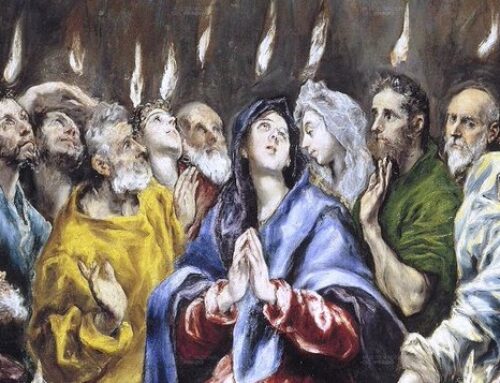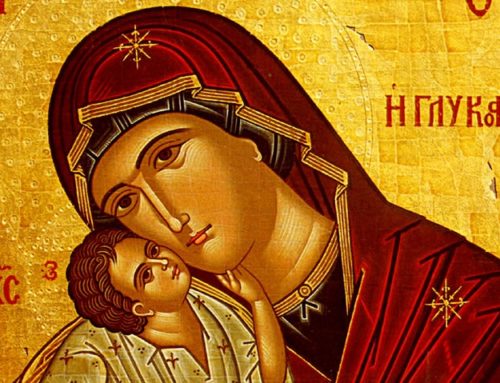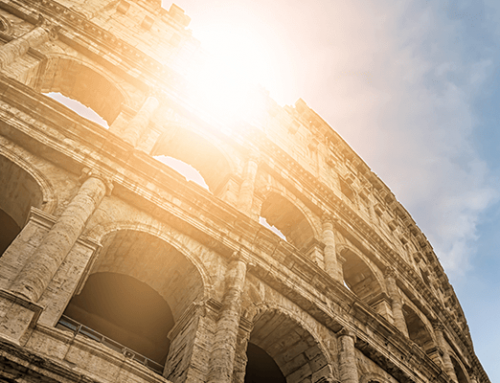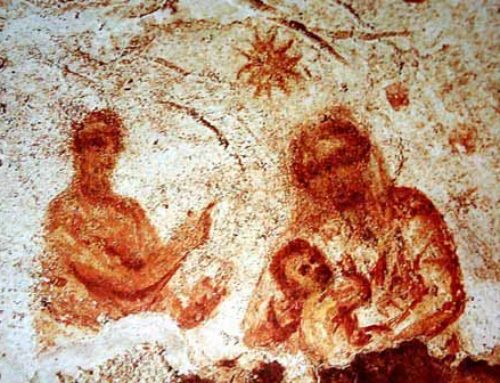Dear Brothers and Sisters!
Today we remember one of the great Fathers of the Church, St. Basil, defined by Byzantine liturgical texts as a “light of the Church.” He was a great bishop of the fourth century, to whom the Churches of the East and West look with great admiration because of his sanctity of life, the excellence of his doctrine and the harmonious synthesis of his speculative and practical skills.
He was born around the year 330 to a family of saints, “a true domestic Church,” who lived in an atmosphere of profound faith. He carried out his studies with the best teachers of Athens and Constantinople. Unfulfilled by his worldly successes, and aware of having lost much time in vain pursuits, he himself confesses: “One day, waking up from a deep sleep, I turned to the wonderful light of the truth of the Gospels … and cried over my miserable life” (cf. Letters 223: PG 32, 824a). Attracted by Christ, I began to look to him and listen to him alone (cf. “Moralia” 80, 1: PG 31, 860bc).
He dedicated himself with determination to the monastic life in prayer, meditation on the sacred Scriptures and the writings of the Fathers of the Church, and to the exercise of charity (cf. Letters 2 and 22), following the example of his sister, St. Macrina, who was already living monastic asceticism. He was later ordained a priest and then, in 370, bishop of Caesarea of Cappadocia in what is present day Turkey.
Through preaching and writing, he carried out intense pastoral, theological and literary activities. With wise balance, he was able to blend service to souls with dedication to prayer and meditation in solitude. Taking advantage of his own personal experience, he favored the foundation of many “fraternities” or Christian communities consecrated to God, which he frequently visited (cf. Gregory of Nazianzus. “Oratio 43,29 in Laudem Basilii”: PG 36,536b). Through his words and his writings, many of which still exist today (cf. “Regulae Brevius Tractatae, Proemio”: PG 31,1080ab), he exhorted them to live and to grow in perfection. Many drew from his writings to establish norms of ancient monasticism, including St. Benedict, who considered St. Basil his teacher (cf. “Regula” 73:5).
In reality, St. Basil created a special kind of monasticism, not closed off from the local Church, but open to it. His monks were part of the local Church, they were its animating nucleus. Preceding others of the faithful in following Christ and not merely in having faith, they showed firm devotion to him — love for him — above all in works of charity. These monks, who established schools and hospitals, were at the service of the poor and showed Christian life in its fullness. The Servant of God, John Paul II, speaking about monasticism, wrote: “Many believe that monasticism, an institution so important for the whole Church, was established for all times principally by St. Basil — or that, at least, the nature of monasticism would not have been so well defined without Basil’s decisive contribution” (“Patres Ecclesiae,” 2).
As bishop and pastor of his vast diocese, Basil constantly worried about the difficult material conditions in which the faithful lived; he firmly condemned evils; he worked in favor of the poor and marginalized; he spoke to rulers in order to relieve the sufferings of the people, above all in moments of disaster; he looked out for the freedom of the Church, going up against those in power to defend the right to profess the true faith (cf. Gregory of Nazianzus, “Oratio 43: 48-51 in Laudem Basilii”: PG 36,557c-561c). To God, who is love and charity, Basil gave witness by building hospitals for the needy (cf. Basil, Letters 94: PG 32,488bc), much like a city of mercy, that took its name from him “Basiliade” (cf. Sozomeno, “Historia Eccl.” 6,34: PG 67, 1387a). It has been the inspiration for modern hospital institutions of recovery and cure of the sick.
Aware that “the liturgy is the summit toward which the activity of the Church is directed; at the same time it is the font from which all her power flows” (“Sacrosanctum Concilium,” 10), Basil, though he was concerned with charity, the sign of faith, was also a wise “liturgical reformer” (cf. Gregory of Nazianzus, “Oratio 43,34 in Laudem Basilii”: PG 36,541c). He left us a wonderful Eucharistic prayer (or anaphora) which is named after him, and helped to organize the prayer and the psalmody:
Because of him the people loved and knew the Psalms, and came to pray them even during the night (cf. Basil, “In Psalmum” 1,1: PG 29,212a-213c). In this way we can see how liturgy, adoration and prayer come together with charity, and depend upon each other.
With zeal and courage, Basil opposed heretics, who denied that Jesus Christ is God like the Father (cf. Basil, Letters 9,3: PG 32,272a; “Ep.” 52: 1-3: PG 32,392b-396a; “Adv. Eunomium” 1,20: PG 29,556c). In the same way, contrary to those who denied the divinity of the Holy Spirit, he taught that the Spirit is also God, and “must be numbered and glorified with the Father and the Son” (cf. “De Spiritu Sancto”: SC 17bis, 348). Because of this, Basil is one of the great Fathers that formulated the doctrine of the Trinity: one God, because he is love, he is God in three persons, who form the most profound unity in existence, divine unity.
In his love for Christ and his Gospel, the great Cappadocian also worked to heal the divisions within the Church (cf. Letters 70 and 243), working so that all might be converted to Christ and his word (cf. “De Iudicio” 4: PG 31,660b-661a), a unifying force, which all believers must obey (cf. ibid. 1-3: PG 31,653a-656c).
In conclusion, Basil spent himself completely in faithful service to the Church in his multifaceted episcopal ministry. According to the program laid out by him, he became “apostle and minister of Christ, dispenser of the mysteries of God, herald of the kingdom, model and rule of piety, eye of the body of the Church, pastor of Christ’s sheep, merciful physician, father and nurturer, cooperator with God, God’s farmer and builder of God’s temple” (cf. “Moralia” 80: 11-20: PG 31: 864b-868b).
This is the program that the holy bishop gives to those who proclaim the word — yesterday like today — a program that he himself generously put into practice. In 379, Basil, not yet 50 years old, consumed by hard work and asceticism, returned to God, “in the hope of eternal life, through our Lord Jesus Christ” (“On Baptism” 1,2,9). He was a man who truly lived with his gaze fixed on Christ, a man of love for his neighbor. Full of the hope and the joy of faith, Basil shows us how to be real Christians.
[Translation of the catechesis by ZENIT; original English © Copyright 2007 — Libreria Editrice Vaticana]
[The Pope then greeted the people in several languages. In English, he said:]
Dear Brothers and Sisters,
Our catechesis on the church Fathers today brings us to the great fourth-century bishop, Saint Basil, whom the Byzantine liturgy refers to as a “light of the Church.” Though he had received the best education possible, at the conclusion of his studies he yearned to learn more. He discovered that only Christ could fulfill him, and so dedicated himself completely to a monastic life of prayer and charitable works. Ordained Bishop of Caesarea in Cappadocia in 370, Basil tirelessly cared for his people and devoted himself continuously to meditation on the sacred word. He attended to the material needs of his flock, supported the poor and marginalized, and defended the freedom to profess the Christian faith. A special love for the sick led him to found many hospitals. Basil’s pastoral activity flowed from a deep devotion to the sacred liturgy; in fact, the Church still possesses a Eucharistic prayer bearing his name. Basil also firmly corrected those who denied the divinity of either Christ or the Holy Spirit. We find in Basil an outstanding model of free, total, and uncompromising service to the Church. May God give us the courage to imitate him.
I extend a cordial greeting to the English-speaking pilgrims present at today’s audience, especially the athletes and organizers of the European Maccabi Games. May God bestow abundant blessings upon all of you!
[The Pope then made an appeal to young people:]
Dear Young People,
One year from now we will meet at World Youth Day in Sydney! I want to encourage you to prepare well for this marvelous celebration of the faith, which will be spent in the company of your bishops, priests, Religious, youth leaders and one another. Enter fully into the life of your parishes and participate enthusiastically in diocesan events! In this way you will be equipped spiritually to experience new depths of understanding of all that we believe when we gather in Sydney next July.
“You will receive power when the Holy Spirit has come upon you; and you will be my witnesses to the ends of the earth” (Acts 1:8). As you know, these words of Jesus form the theme of World Youth Day 2008. How the Apostles felt upon hearing these words, we can only imagine, but their confusion was no doubt tempered with a sense of awe and of eager anticipation for the coming of the Spirit. United in prayer with Mary and the others gathered in the Upper Room (cfr Acts 1:14), they experienced the true power of the Spirit, whose presence transforms uncertainty, fear, and division into purpose, hope and communion.
A sense of awe and eager anticipation also describes how we feel as we make preparations to meet in Sydney. For many of us, this will be a long journey. Yet Australia and its people evoke images of a warm welcome and wondrous beauty, of an ancient aboriginal history and a multitude of vibrant cities and communities. I know that already the ecclesial and government authorities, together with numerous young Australians, are working very hard to ensure an exceptional experience for us all. I offer them my heartfelt thanks.
World Youth Day is much more than an event. It is a time of deep spiritual renewal, the fruits of which benefit the whole of society. Young pilgrims are filled with the desire to pray, to be nourished by Word and Sacrament, to be transformed by the Holy Spirit, who illuminates the wonder of the human soul and shows the way to be “the image and instrument of the love which flows from Christ” (Deus Caritas Est, 33).
It is this love — Christ’s love — for which the world yearns. Thus you are called by so many to “be his witnesses.” Some of you have friends with little real purpose in their lives, perhaps caught up in a futile search for endless new experiences. Bring them to World Youth Day too! In fact, I have noticed that against the tide of secularism many young people are rediscovering the satisfying quest for authentic beauty, goodness and truth. Through your witness you help them in their search for the Spirit of God. Be courageous in that witness! Strive to spread Christ’s guiding light, which gives purpose to all life, making lasting joy and happiness possible for everyone.
My dear young people, until we meet in Sydney, may the Lord protect you all. Let us entrust these preparations to Our Lady of the Southern Cross, Help of Christians. With her, let us pray: “Come Holy Spirit, fill the hearts of your faithful, and enkindle in them the fire of your love.”







Leave A Comment
You must be logged in to post a comment.